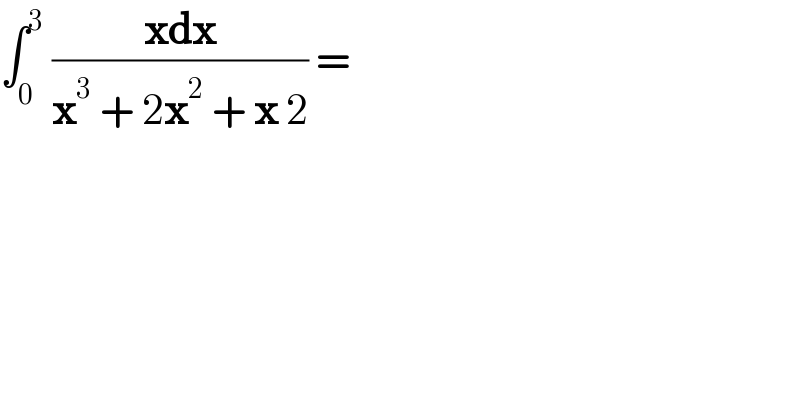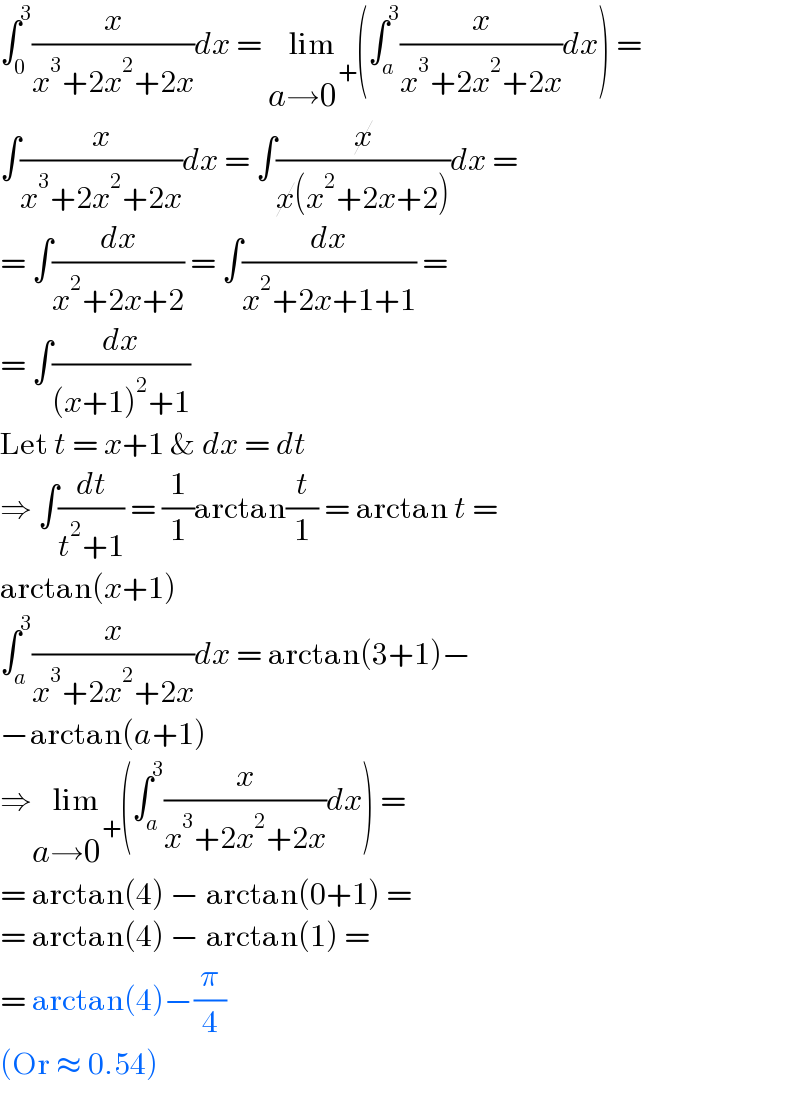Question Number 163472 by Zaynal last updated on 07/Jan/22

$$\int_{\mathrm{0}} ^{\mathrm{3}} \:\frac{\boldsymbol{\mathrm{xdx}}}{\boldsymbol{\mathrm{x}}^{\mathrm{3}} \:+\:\mathrm{2}\boldsymbol{\mathrm{x}}^{\mathrm{2}} \:+\:\boldsymbol{\mathrm{x}}\:\mathrm{2}}\:= \\ $$
Answered by alephzero last updated on 07/Jan/22

$$\int_{\mathrm{0}} ^{\mathrm{3}} \frac{{x}}{{x}^{\mathrm{3}} +\mathrm{2}{x}^{\mathrm{2}} +\mathrm{2}{x}}{dx}\:=\:\underset{{a}\rightarrow\mathrm{0}^{+} } {\mathrm{lim}}\left(\int_{{a}} ^{\mathrm{3}} \frac{{x}}{{x}^{\mathrm{3}} +\mathrm{2}{x}^{\mathrm{2}} +\mathrm{2}{x}}{dx}\right)\:= \\ $$$$\int\frac{{x}}{{x}^{\mathrm{3}} +\mathrm{2}{x}^{\mathrm{2}} +\mathrm{2}{x}}{dx}\:=\:\int\frac{\cancel{{x}}}{\cancel{{x}}\left({x}^{\mathrm{2}} +\mathrm{2}{x}+\mathrm{2}\right)}{dx}\:=\: \\ $$$$=\:\int\frac{{dx}}{{x}^{\mathrm{2}} +\mathrm{2}{x}+\mathrm{2}}\:=\:\int\frac{{dx}}{{x}^{\mathrm{2}} +\mathrm{2}{x}+\mathrm{1}+\mathrm{1}}\:= \\ $$$$=\:\int\frac{{dx}}{\left({x}+\mathrm{1}\right)^{\mathrm{2}} +\mathrm{1}} \\ $$$$\mathrm{Let}\:{t}\:=\:{x}+\mathrm{1}\:\&\:{dx}\:=\:{dt} \\ $$$$\Rightarrow\:\int\frac{{dt}}{{t}^{\mathrm{2}} +\mathrm{1}}\:=\:\frac{\mathrm{1}}{\mathrm{1}}\mathrm{arctan}\frac{{t}}{\mathrm{1}}\:=\:\mathrm{arctan}\:{t}\:= \\ $$$$\mathrm{arctan}\left({x}+\mathrm{1}\right) \\ $$$$\int_{{a}} ^{\mathrm{3}} \frac{{x}}{{x}^{\mathrm{3}} +\mathrm{2}{x}^{\mathrm{2}} +\mathrm{2}{x}}{dx}\:=\:\mathrm{arctan}\left(\mathrm{3}+\mathrm{1}\right)− \\ $$$$−\mathrm{arctan}\left({a}+\mathrm{1}\right) \\ $$$$\Rightarrow\underset{{a}\rightarrow\mathrm{0}^{+} } {\mathrm{lim}}\left(\int_{{a}} ^{\mathrm{3}} \frac{{x}}{{x}^{\mathrm{3}} +\mathrm{2}{x}^{\mathrm{2}} +\mathrm{2}{x}}{dx}\right)\:=\: \\ $$$$=\:\mathrm{arctan}\left(\mathrm{4}\right)\:−\:\mathrm{arctan}\left(\mathrm{0}+\mathrm{1}\right)\:=\: \\ $$$$=\:\mathrm{arctan}\left(\mathrm{4}\right)\:−\:\mathrm{arctan}\left(\mathrm{1}\right)\:=\: \\ $$$$=\:\mathrm{arctan}\left(\mathrm{4}\right)−\frac{\pi}{\mathrm{4}}\: \\ $$$$\left(\mathrm{Or}\:\approx\:\mathrm{0}.\mathrm{54}\right) \\ $$
